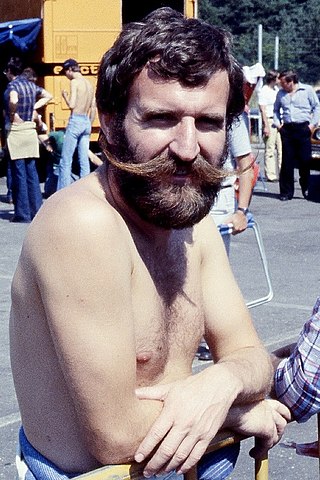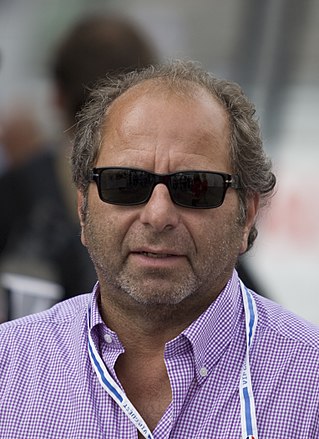
The Automobil-Verkehrs- und Übungsstraße, known as AVUS, is a public road in Berlin, Germany. Opened in 1921, it was also used as a motor racing circuit until 1998. Today, the AVUS forms the northern part of the Bundesautobahn 115.

The Porsche 935 is a race car that was developed and manufactured by German automaker Porsche. Introduced in 1976 as the factory racing version of the 911 (930) Turbo and prepared for FIA-Group 5 rules, it was an evolution of the Carrera RSR 2.1 turbo prototype, the second place overall finisher in the 1974 24 Hours of Le Mans.

Zakspeed is a motor racing team from Germany, founded in 1968 by Erich Zakowski and then run by his son Peter Zakowski. It is based in Niederzissen, Rhineland-Palatinate, around 25 kilometres (16 mi) from the Nürburgring circuit.

Harald Ertl was an Austrian racing driver and motorsport journalist. He was born in Zell am See and attended the same school as Grand Prix drivers Jochen Rindt, Helmut Marko and Niki Lauda.

The Circuit Zolder, also known as Circuit Terlamen, is an undulating 4.011 km (2.492 mi) motorsport race track in Heusden-Zolder, Belgium.

Throughout its history, BMW cars and motorcycles have been successful in a range of motorsport activities. Apart from the factory efforts, many privateer teams enter BMW road cars in touring car racing. BMW also entered cars or provided engines in Formula One, Formula Two and sportscar racing. BMW is currently active in IMSA, the Isle of Man TT, the North West 200, the Superbike World Championship and the Deutsche Tourenwagen Masters.
The Deutsche Tourenwagen Meisterschaft (DTM) was a touring car racing series held from 1984 to 1996. Originally based in Germany, it held additional rounds elsewhere in Europe and later worldwide.

Jörg Müller is a Dutch-born German BMW factory driver.

Klaus Karl Ludwig is a German racing driver.

Schnitzer Motorsport was a motorsport team based in Freilassing near Munich, Germany. From the early days of its establishment, the team mostly operated an automobile racing squad for BMW, and had remarkable results in touring car and sports car racing. The team would often run the cars for BMW under the name of "BMW Motorsport". In 2012, the team operated the DTM team for BMW under the name of "BMW Team Schnitzer".

The Norisring is a street circuit in Nuremberg, Bavaria, Germany. Originally established as a motorcycle racing venue in 1947 and named in a 1950 competition to win a light motorcycle, the track became known as a sports car racing venue in the 1970s. Since 2000, it has been annually used by the Deutsche Tourenwagen Masters, the premier Germany-based touring car racing series. The length of the simple track with two hairpin turns and a chicane has been set to 2.300 km (1.429 mi) since 1972, after various lengths were used in its early years.

Harald Grohs is a racing driver and team owner from Essen, Germany.

The Sauber SHS C6 was a Group C prototype racing car built by Swiss manufacturer Sauber and engineering firm Seger & Hoffman, intended for competition in the World Endurance Championship and Deutsche Rennsport Meisterschaft series. Seger & Hoffman left the project later in 1982, leaving the car completely under Sauber's control.

The ADAC Norisring Nürnberg 200 Speedweekend is an auto racing event taking place at the Norisring temporary street circuit in Nuremberg, Germany. First ran in 1967, the Trophy has hosted a variety of national and international series, ranging from touring cars to sports cars. The Norisring Trophy is currently part of the Deutsche Tourenwagen Masters series.

The BMW M1 Procar Championship, sometimes known simply as Procar, was a one-make auto racing series created by Jochen Neerpasch, head of BMW Motorsport GmbH, the racing division of automobile manufacturer BMW. The series pitted professional drivers from the Formula One World Championship, World Sportscar Championship, European Touring Car Championship, and other international series against one another using identically modified BMW M1 sports cars.

John Fitzpatrick is a British former racing driver, winning many titles throughout his career. He works within motorsport as a consultant doing corporate events and driver management. He published a book "Fitz-My Life at the Wheel" in 2016.
Frank Jelinski is a German former racing driver.
Class 1 Touring Cars refers to two generations of prototype silhouette-style touring car regulations employed by the FIA.
Gebhardt Motorsport is a German motor racing team and constructor founded by brothers Günther and Fritz Gebhardt. Originally the team was formed to further the open wheel racing career of Günther Gebhardt as he progressed through Formula Super Vee and Formula 3 racing a succession of March and Ralt open wheelers. Gebhardt reached Formula 2 in 1982 racing a March 812 BMW but went no further before shifting to sportscar endurance racing.
Obermaier-Racing GmbH was a German auto racing team and tuning garage founded by Hans Obermaier and Jürgen Lässig. Specializing in Porsches for much of their history, the team competed at the top level of the World Sportscar Championship from 1983 until 1990 before finding success in the various incarnations of the Porsche Carrera Cup. The team was later known as Oberbayern Motorsport before their auto racing activities ceased in 2000.














